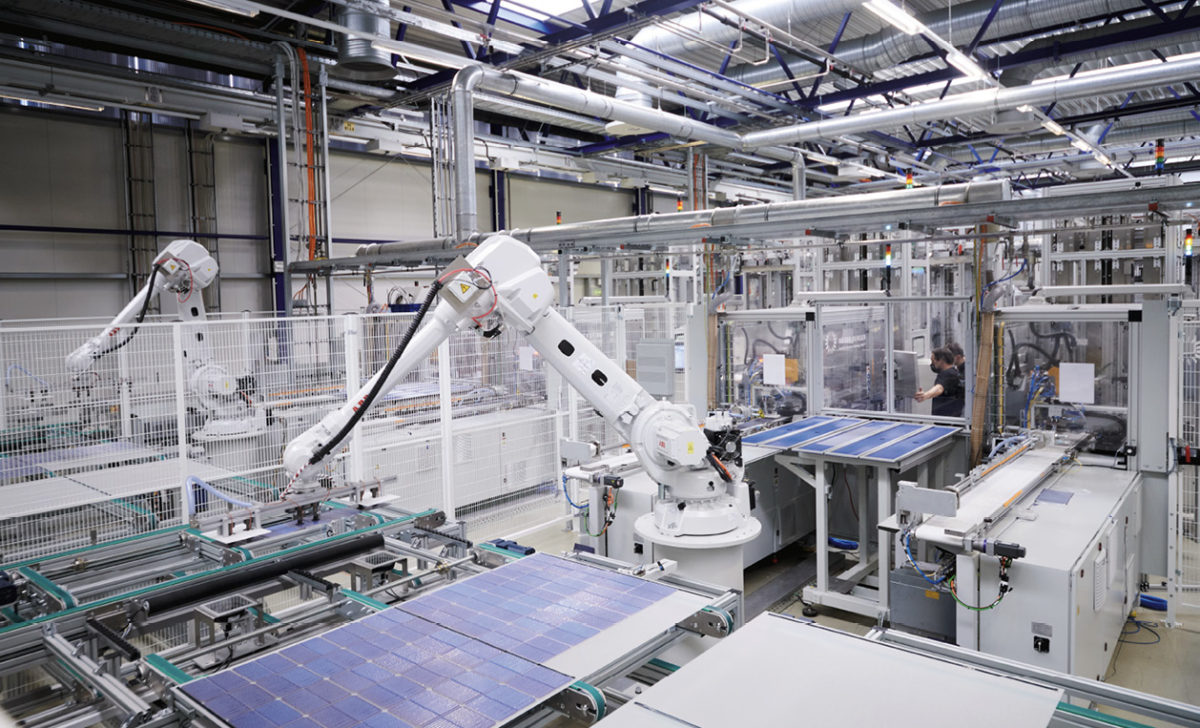From pv magazine Germany
Meyer Burger is steadily ramping up cell and module production at its factory in Bitterfeld-Wolfen, Germany. Last year, it met its production volume target of 321.1 MW, as stated in its newly published annual report for 2022. It reportedly produces 830,000 solar modules and 700,000 solar cells per day.
Following completion of its production ramp-up, its capacity will increase to more than 1 million solar cells per day, according to Meyer Burger. The second production line started operations in September.
“There is growing certainty that the production lines at our German locations will be able to reach the defined nominal capacities when fully operational,” Meyer Burger said.
However, the manufacturer is also plagued by worries, especially when it comes to delivery times for electronic components. At least in theory, it is well on the way to becoming a gigawatt manufacturer. This year, production capacities will be expanded to 1.4 GW per year. By the end of 2024, this should increase to 3 GW. And the manufacturer has decided to scale its planned module production in the United States from 1.6 GW to around 2 GW. The increased output of about 25% is primarily attributed to the ramped-up production of glass-glass modules.
The expansion will require capital above all, and Meyer Burger is trying to gather as many sources as possible. According to the company, “significant investments in new systems” are needed for the necessary expansion of cell capacity in Thalheim. To this end, the manufacturer has concluded new purchase agreements for the additional production volume from 2025 with two undisclosed “well-known” companies.
The purchase guarantee runs for several years, and the contracts are set up in a similar way to a purchase agreement previously concluded with US project developer Desri, according to Meyer Burger. Investments in new systems will be largely covered by corresponding advance payments from customers.
Meyer Burger has also submitted an application for the third call for proposals from the EU Innovation Fund in March. The company is hoping for funding in the three-digit million range to support development of gigawatt-scale solar cell and module production in several European countries. A decision is expected in the summer of 2023.
pv magazine print edition
In addition, the European Commission’s recently published Green Deal Industrial Plan gives cause for further hope. EU member states are expected to implement it in the second quarter of this year, which could positively impact Meyer Burger's business in Europe. In view of the generous support for industrial policy in the US through the US Inflation Reduction Act (IRA), Europe must quickly follow suit.
In addition to the status quo and plans for the future, Meyer Burger’s annual report also contains the financial figures for the past year. The company’s sales rose from CHF 39.9 million ($43.56 million) to CHF 147.2 million within a year. It said sales of 250 MW of heterojunction modules were worth CHF 125 million The company stated the net result for 2022 at CHF -69.9 million, thus reducing the loss by around one-third in comparison to last year.
Meyer Burger currently sells its modules in 15 countries at “attractive sales prices”, according to the company. The strongest markets for the manufacturer are currently Switzerland, Germany, Belgium, and Italy. Australia and the UK, among others, are to be added as new sales markets this year. Distribution takes place via around 50 wholesalers and more than a thousand registered installers.
Solar + Storage España
This content is protected by copyright and may not be reused. If you want to cooperate with us and would like to reuse some of our content, please contact: editors@pv-magazine.com.




3 comments
By submitting this form you agree to pv magazine using your data for the purposes of publishing your comment.
Your personal data will only be disclosed or otherwise transmitted to third parties for the purposes of spam filtering or if this is necessary for technical maintenance of the website. Any other transfer to third parties will not take place unless this is justified on the basis of applicable data protection regulations or if pv magazine is legally obliged to do so.
You may revoke this consent at any time with effect for the future, in which case your personal data will be deleted immediately. Otherwise, your data will be deleted if pv magazine has processed your request or the purpose of data storage is fulfilled.
Further information on data privacy can be found in our Data Protection Policy.